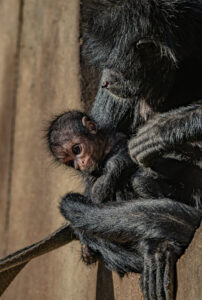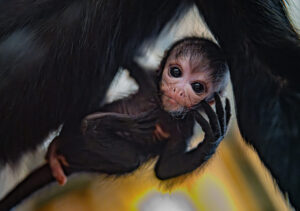A rare new monkey has been born at Chester Zoo. The baby Colombian black-headed spider monkey was spotted by zoo visitors being cradled in the arms of Kiara, its Mum.

Credit Chester Zoo
The monkey has been named Olive. The species is extremely vulnerable to extinction, as more then 80% of its population been lost in the last half of the century. The International Union for the Conservation of Nature has listed the species as vulnerable, meaning it faces a high risk of becoming extinct.
The spider monkey is found mainly in Colombia and Panama in South America where it faces threats from hunting and the illegal wildlife trade. This has caused severe habitat fragmentation and now requires urgent attention to help safeguard their future.
Chester Zoo is a world-leading conservation and education is committed to help preventing extinction, it has provided great awareness for conservation and environmental challenges. The zoo is home to more than 27,000 animals and more than 500 species. Numerous research studies have started to look at the spider monkey group, recording behavioural data which have then been transferred and applied to vital conservation action in the wild.
Mary Brayshaw, Head of Mammals at the conservation zoo said: “Life as a baby spider monkey is very bumpy as these fascinating primates are incredibly agile, spending the majority of their time leaping between the treetops and using their tails to hang upside down while foraging for food. It’s fantastic to see Kiara cradling baby Oliva closely and being so attentive. Olive will cling to mum’s belly for a few months, before gaining enough confidence to start branching off on her own to start exploring independently – which will be great to see.

Credit Chester Zoo
Spider monkeys face huge survival challenges in the wild. In welcoming new life into the conservation breeding programme, were contributing to global efforts to secure a future for these highly endangered primates. In tandem with offering education, carrying out scientific research and improving public awareness, we hope o play our part in reversing their decline and ensuring the prices thrives long into the future.”
It works with more than 3,000 species globally, including 140 international animal conversation breeding programmes, which are ensuring the survival of species on the very brink of extinction. It’s also home to five national plant collections, compromising of more than 1,000 species.
The species gets it name from its spider like appearance thanks to their long, narrow limbs, long tails and black fur. Their prehensile tails are often longer than their bodies, acting as an extra limb that wraps around branches and allows them to move freely while collecting food with their hands.
Credit images Chester Zoo










